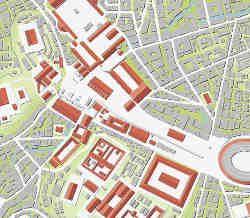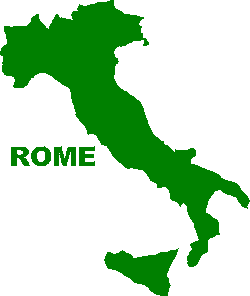The earliest empires had been in
the east. Egypt, Mesopotamia, China, India, and Greece were all
home to at least one powerful civilization. About 387BC, a city
on the Italian peninsula began acquiring land and building an empire.
That city was Rome.
Rome
grew into an empire in part because of how they treated the people
they conquered. If a city was defeated by another empire, its citizens
were forced from the land if they were lucky, and enslaved if they
were not. When the Romans defeated a city, they extended the rights
of citizenship to the people they conquered. Rome conquered many
of its "allies" by force, but once the new people became citizens,
they often joined the Roman army. Rome managed to unify most of
modern nation of Italy by 265BC.
 Rome
is an ideal place for a city. It is located along the banks of the
Tiber River. The river made it easy to travel to and from the sea.
The Tiber is very shallow near Rome. A shallow portion of a river
is called a ford. The ford made it easier for people to cross the
river. Seven hills surround Rome. The hills make it harder for invaders
to approach the city and served as lookout areas for the Romans.
Rome is also close to excellent farmland and an abundance of wood
and stone. Civilizations have grown and prospered in Rome for thousands
of years, which is why Rome is nicknamed "the Eternal City."
Rome
is an ideal place for a city. It is located along the banks of the
Tiber River. The river made it easy to travel to and from the sea.
The Tiber is very shallow near Rome. A shallow portion of a river
is called a ford. The ford made it easier for people to cross the
river. Seven hills surround Rome. The hills make it harder for invaders
to approach the city and served as lookout areas for the Romans.
Rome is also close to excellent farmland and an abundance of wood
and stone. Civilizations have grown and prospered in Rome for thousands
of years, which is why Rome is nicknamed "the Eternal City."

 Rome
is an ideal place for a city. It is located along the banks of the
Tiber River. The river made it easy to travel to and from the sea.
The Tiber is very shallow near Rome. A shallow portion of a river
is called a ford. The ford made it easier for people to cross the
river. Seven hills surround Rome. The hills make it harder for invaders
to approach the city and served as lookout areas for the Romans.
Rome is also close to excellent farmland and an abundance of wood
and stone. Civilizations have grown and prospered in Rome for thousands
of years, which is why Rome is nicknamed "the Eternal City."
Rome
is an ideal place for a city. It is located along the banks of the
Tiber River. The river made it easy to travel to and from the sea.
The Tiber is very shallow near Rome. A shallow portion of a river
is called a ford. The ford made it easier for people to cross the
river. Seven hills surround Rome. The hills make it harder for invaders
to approach the city and served as lookout areas for the Romans.
Rome is also close to excellent farmland and an abundance of wood
and stone. Civilizations have grown and prospered in Rome for thousands
of years, which is why Rome is nicknamed "the Eternal City."